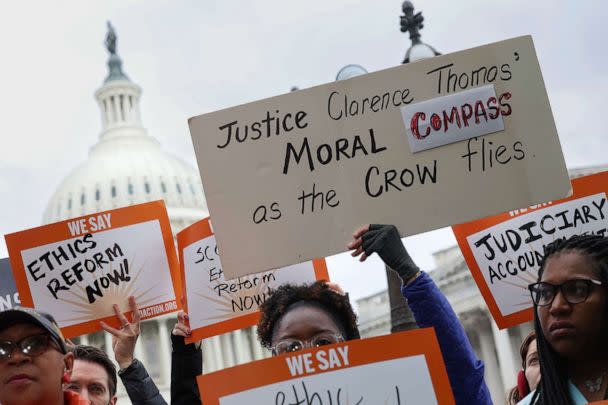Key takeaways from Senate hearing on Supreme Court ethics

Supreme Court ethics and questions surrounding the conduct of Justice Clarence Thomas were on full display Tuesday at a Senate Judiciary Committee hearing.
The panel heard from a range of legal experts on whether Congress has the authority to require the high court to adopt an enforaceable code of conduct. Democrats have pushed for such legislation following reports scrutinizing Justice Thomas' nondisclosure of private luxury travel and accommodations from a wealthy Republican donor.
MORE: New bill would require Supreme Court to create a code of conduct amid recent controversies
"How low can the court go?" chairman Dick Durbin, D-Ill., asked as the hearing kicked off.
"We wouldn't tolerate this from a city council member or an alderman," Durbin added. "It falls short of ethical standards we expect of any public servant in America. And yet the Supreme Court won't even acknowledge it's a problem."

Meanwhile, Republicans made it clear they would push back on any congressional attempt to impose rules on the court and accused Democrats of "political theater."
All nine current members of the Supreme Court, including the three liberal justices, have suggested they oppose legislative proposals for independent oversight and mandatory compliance with ethics rules. Last week they signed a rare public statement on "ethics principles and practices" reaffirming voluntary adherence to a general code of conduct but resisting outside regulation.
As the hearing was underway, protesters gathered outside the U.S. Capitol to call for ethical reforms to the nation's highest court. The Supreme Court is the only branch of government that operates without a formal enforceable code of conduct.
Here are some key takeaways:
Senators agree on need for transparency but disagree on path forward
There was bipartisan agreement that the Supreme Court needs to be more forthcoming about its conduct and the guidelines justices abide by.
"I, too, have expressed a desire for the court to be more transparent, to have rules the public can relate to," Republican Sen. Lindsey Graham, the ranking member of the committee, said in his opening statement.

The panel was divided, however, on the role of Congress in this debate. Republicans argued Congress has no authority to impose enforceable ethics rules and outside enforcement.
Republican Sen. John Kennedy said such a step would be "unconstitutional and unnecessary."
Legal experts, too, were split on the matter in Tuesday's hearing. Though J. Michael Luttig, a former federal appellate judge popular among conservatives, said in written testimony that while the Supreme Court should enforce such rules itself, Congress "indisputably has the power" to enact laws imposing ethical standards on the court's non-judicial activities.
Republicans defend Thomas, accuse Democrats of 'selective outrage'
Graham accused Democrats of "cherry-picking" instances of travel and gifts to conservative justices to undermine confidence in the court. He listed all-expense-paid trips and monetary awards given to various justices, including Ruth Bader Ginsburg and Sonia Sotomayor, over the years.
"This is an unseemly effort by the Democratic left to destroy the legitimacy of the Roberts court," Graham said. "There's a very selective outrage here."

Other GOP members echoed that argument, claiming this ethics argument is an attempt by Democrats to push back against the court in light of recent decisions by the conservative majority.
"Today's hearing is just one political theater to delegitimize our judicial system, particularly the Supreme Court," said Iowa Sen. Chuck Grassley.
Texas Sens. John Cornyn and Ted Cruz evoked comments made by Thomas during his bitter confirmation hearings in 1991. Cornyn played footage of Thomas, who was facing harassment accusations by Anita Hill, famously calling the proceedings a "high-tech lynching."
"It is sad to see 30 years later this committee is again engaged in the same despicable tactics," Cruz said, accusing Democrats of racist attacks.
Democrats want independent panel of retired judges to police the court
"The justices have been playing out of bounds," declared Sen. Sheldon Whitehouse, a Rhode Island Democrat who has sponsored legislation to require adoption of an ethics code, mandate terms for when a justice must recuse from a case, and tighten financial disclosure requirements for members of the high court.
Retired federal judge Jeremy Fogel, who once sat on the Judicial Conference's Committee on Financial Disclosure, which facilitates compliance with federal ethics law across the judiciary, testified that the "absence of a formal structure [of ethics] is untenable and that a lack of clarity feeds the perception" of a partisan Supreme Court. He recommended an independent panel of retired judges to confidentially work with the justices to ensure compliance with their guidelines.

Roberts declines to appear, responds in writing
Absent from the hearing was Chief Justice John Roberts, despite Durbin's invitation to Roberts -- or any other justice -- to appear before the committee.
Roberts instead briefly responded to questions in a written statement, in which he highlighted the role of the Judicial Conference's "Committee on Financial Disclosure" in helping the justices stay in compliance with the law.
That body, he said, reaches out to justices when information surfaces about incomplete or inaccurate filings. To his knowledge, there's never been an instance of a justice and the committee failing to resolve an issue -- and a penalty has never been imposed on a justice.
MORE: Chief Justice Roberts declines invitation to testify about Supreme Court ethics
Durbin swiped at Roberts for not appearing on Tuesday, stating, "The reality is that sitting justices have testified at 92 congressional hearings since 1960."
"Answering legitimate questions from the people's representatives is one of the checks and balances that helps preserve the separation of powers," he said.
Key takeaways from Senate hearing on Supreme Court ethics originally appeared on abcnews.go.com
